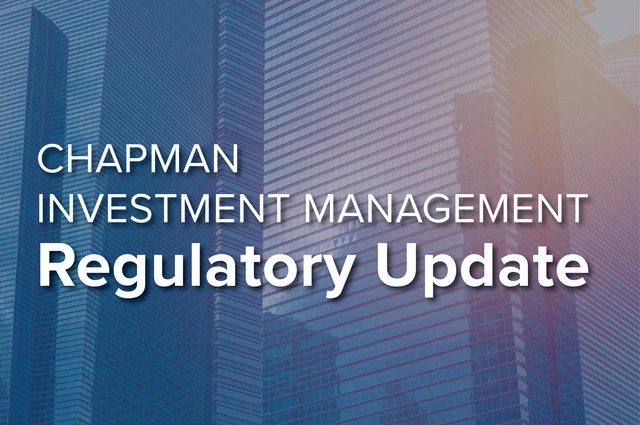- Topic: Municipal Issuers
80 matches.
Changes are coming for health care organizations that are borrowers with respect to municipal securities. New data standards required under the Financial Data Transparency Act of 2022 (FDTA) could take effect as early as 2027. In the March/April 2025 issue of AHLA’s Health Law Connections, Chapman partners Mary Kimura and Hillary Phelps provide a summary of the FDTA and the joint standards proposed in August 2024, including reactions from municipal securities industry participants and a look ahead at the next stages of the rulemaking process. They also explore potential impacts of the new data standards on health care organizations and systems.
On August 22, 2024, a proposed rule (the “Proposed Joint Rule”) mandated by the Financial Data Transparency Act of 2022 (the “FDTA”) and adopted by nine federal financial regulators, including the U.S. Securities and Exchange Commission (the “SEC” and, together with the other eight regulators, the “Covered Agencies”), was published in the Federal Register.
On June 2, 2022, the Securities and Exchange Commission charged the Town of Sterlington, Louisiana, its former mayor, Vern A. Breland, the town’s unregistered municipal advisor, Twin Spires Financial LLC and its owner, Aaron B. Fletcher with fraud in connection with the sale of $5.8 million in municipal bonds in two offerings in 2017 and 2018.
The Public Finance Initiative (PFI) and the National League of Cities (NLC) have launched the Bond Markets and Racial Equity Project to identify the factors in a municipal bond issuance that signal progress toward racial equity and income equality to investors and other stakeholders. Additionally, PFI and NLC will use the Project to develop resources that can be used by governmental issuers to center racial equity in municipal bond-funded infrastructure investments and to measure how social determinants of equity change over time on a uniform basis. The unprecedented Project is funded by a $4M grant from the Robert Wood Johnson Foundation. By funding the Project, the Foundation aims to help issuers leverage the municipal bond market in a meaningful way to help correct racial and economic inequities.
- Journal of Taxation of Financial Products
This article in the Journal of Taxation of Financial Products outlines tax-exempt municipal debt securitization transactions and associated tax issues. Chapman authors, David Nirenberg, Brent Feller, and Steven Kopp, provide an in-depth look at the primary tax issues for parties to both single-class and multiple-class tax-exempt bond securitization transactions.
On September 16, 2021, the Securities and Exchange Commission charged Sweetwater Union High School District, a San Diego County, California, school district serving approximately 47,000 students, and its former Chief Financial Officer, Karen Michel, with making material misstatements and omissions in connection with the District’s April 2018 $28 million bond issue.
- July/August 2021Futures & Derivatives Law Report
In 2017, the Financial Conduct Authority, the U.K. authority that oversees the London interbank offered rate, announced that LIBOR may be phased out after the end of 2021. The announcement applied to all currency and term variants of LIBOR, including U.S. dollar denominated LIBOR.
The date of the General Primary Election to be held in 2022 has been changed from March 15, 2022, to June 28, 2022. On May 31, 2021, the Illinois General Assembly adopted Senate Bill 825, which became Public Act 102-0015 after being signed into law by the Governor on June 17, 2021.
On June 16, the Securities and Exchange Commission issued an order granting registered municipal advisors an emergency, temporary conditional exemption from broker registration under Section 15 of the Securities Exchange Act of 1934 in connection with certain direct placement activities.
The General Assembly passed Senate Bill 2135 on May 23 and the Governor signed the same on June 12. The Act provides greater flexibility for public bodies to conduct business remotely when in-person attendance is not feasible due to a disaster.
On June 11, the Federal Reserve Bank of New York issued an updated Notice of Interest for the Municipal Liquidity Facility to reflect the expansion of eligibility for the facility.
On June 3, the Federal Reserve announced expanded eligibility for its Municipal Liquidity Facility. Under the new terms, a State that does not have at least two total counties or cities that meet the minimum population requirements will be able to identify a city or county to be an Eligible Issuer.
On May 23, the General Assembly passed Senate Bill 2135, providing for amendments to Sections 2.01 and 7 of the Open Meetings Act of the State of Illinois. The changes provide greater flexibility for public bodies to conduct business remotely when in-person attendance is not feasible due to a disaster.
The Federal Reserve today issued an amended term sheet establishing pricing criteria for its Municipal Liquidity Facility last described in our April 29 Client Alert. The Federal Reserve Bank of New York also issued today a revised FAQs for the facility.
On May 4, the SEC Chairman and the Director of the Office of Municipal Securities issued a public statement encouraging issuers, conduit borrowers and other obligated persons of municipal securities to make disclosures describing the effects of the COVID‑19 pandemic on their finances and operations.
Treasury Department guidance issued on April 22 summarizes three requirements for the use of payments from the Coronavirus Relief Fund. On May 4, FAQs were issued that “supplements” the guidance by answering a long series of questions about Eligible Expenditures and a shorter list of questions about the Administration of Fund Payments.
On April 27, the Federal Reserve issued a press release announcing changes to the Municipal Lending Facility described in previous client alerts. At the same time, the Federal Reserve Bank of New York, as sole Reserve Bank lender for the facility, issued a FAQs for the facility.
- April 22, 2020 (Updating an April 13, 2020 Client Alert)
On April 9, the Federal Reserve issued term sheets for six “new” funding facilities under the CARES Act. This client alert describes in detail the Municipal Liquidity Facility.
In these uncertain times, parties to bond documents (including documents such as continuing covenant agreements) may wish to waive, modify or renegotiate certain provisions, including the forbearance and deferral of debt service, the waiver of provisions or the exercise of certain options.
On February 18, the SEC issued an order approving a proposed MSRB rule change updating the MSRB’s Electronic Municipal Market Access system website.
On February 7, the SEC Office of Municipal Securities published Staff Legal Bulletin No. 21 that addresses the application of the antifraud provisions of Section 10(b) of the Securities Exchange Act of 1934.
On February 10, the SEC’s Fixed Income Market Structure Advisory Committee approved a series of recommendations designed to improve the timeliness of disclosure in the municipal securities market.
The IRS has released a new Form 8038-CP, Return for Credit Payments to Issuers of Qualified Bonds, along with new instructions. Form 8038-CP is used by issuers to claim payments from the federal government representing all or a portion of interest payable on direct pay bonds
On March 28, the Securities and Exchange Commission charged the former controller of the College of New Rochelle, a New York-based not-for-profit college, with violating, and aiding and abetting violations of, the antifraud provisions of the federal securities laws.
Pension shortfalls. Crumbling infrastructure. Wage pressures. These are only a few of the budgetary pressures facing state and local governments. It’s no surprise that, with so many demands on limited tax dollars, funds needed to address social problems are being diverted.
Effective February 27, 2019, there are two new reportable events for which an issuer must provide notice to the Municipal Securities Rulemaking Board’s Electronic Municipal Market Access (EMMA) website.
The SEC Rule 15c2-12 amendments will be effective on and after February 27, 2019 with the effect described in the Release. In addition, the Release describes the SEC’s position on certain material financial obligations that may have an impact on primary offerings in addition to disclosures of reportable events made in the future under Rule 15c2-12.
In October, the U.S. District Court for the Southern District of New York entered a final judgment against Christopher St. Lawrence, the former Supervisor of the Town of Ramapo, New York and Director of Finance and President of the Ramapo Local Development Corporation.
- November/December 2018Pratt's Journal of Bankruptcy Law
A decision by the Court overseeing Puerto Rico’s bankruptcy-like Title III proceeding has reiterated what every secured creditor understands — perfection matters. The Court found that bondholders holding $2.9 billion in debt issued by the Employees Retirement System of the Government of the Commonwealth of Puerto Rico were rendered unsecured due to inadequate financing statements.
On August 20, the SEC issued Release No. 34-83885 adopting amendments to Rule 15c2-12 under the Securities Exchange Act of 1934, as amended. The amendments add two new events to the list of reportable events for which an issuer or obligated person must provide notice to the MSRB's Electronic Municipal Market Access website.
In a decision likely to have a far-reaching effect in the municipal debt markets, the Court overseeing Puerto Rico’s bankruptcy-like Title III proceeding ruled that holders of municipal obligations secured by a pledge of special revenues are not guaranteed payment during the pendency of a bankruptcy proceeding.
On December 15, House and Senate conferees reached an agreement on the Tax Cut and Jobs Act and released the final version of the Bill, which is expected to be voted on this week in the House and Senate.
Legislation recently passed by the Illinois House could impact every taxing district in the State if it ultimately becomes law. Senate Bill 851, which amends the Property Tax Extension Limitation Law, implements a tax freeze for certain taxing districts, and authorizes the implementation of a tax freeze for other taxing districts pursuant to referendum.
On November 2, Representative Brady released the proposed text of the long-awaited federal income tax reform bill. If enacted into law, the bill would eliminate all tax-exempt private activity bonds, tax credit bonds and all tax-exempt advance refunding bonds.
The United States Treasury Department has withdrawn proposed regulations dealing with the definition of “political subdivisions” for purposes of the tax-exempt bond provisions of the federal tax law. Political subdivisions are divisions of state or local governmental units that can issue federally tax-exempt bonds.
The Municipal Securities Rulemaking Board recently issued a market advisory to increase awareness among market participants, including issuers and obligated persons, of the importance of disclosing material information fairly, equitably and in the public domain.
On August 23, the Securities and Exchange Commission announced settlements in enforcement actions against the Beaumont Financing Authority; Alan Kapanicas, the former executive director of BFA; O’Connor & Company Securities Inc., the underwriter of the BFA obligations; and Anthony Wetherbee, the co-founder and former primary investment banker of O’Connor Securities.
The former Director of Finance for Ramapo, New York, was found guilty by a federal jury of 20 counts of conspiracy, securities fraud and wire fraud in connection with municipal bonds issued by the Town and by the Ramapo Local Development Corporation, a local not-for-profit corporation to further economic development in the Town.
On June 12, the Department of Treasury issued the first report in a series regarding regulation of the financial system. The report recommends that high-grade municipal bonds be categorized as Level 2B liquid assets instead of generally being excluded as HQLA currently.
The American Bar Association’s Section of Taxation submitted a white paper on the history of the tax-exemption of interest on state and local bonds to the Internal Revenue Service.
- April 2017
This white paper addresses pay for success legislation that has been adopted at the state level, pointing out the various functions of the pay for success financing structure and how individual states have treated these components within their legislation.
The Tax Exempt and Government Entities Division of the Internal Revenue Service announced changes to the information document request process in tax-exempt bond and tax-advantaged bond examinations.
On March 1, the Securities and Exchange Commission issued a release seeking comments on proposed amendments to Rule 15c2-12 under the Securities Exchange Act of 1934, as amended.
The municipal industry has seen a significant change in recent years with the increased activity of the SEC Enforcement Division and, in particular, its Public Finance Abuse Unit. This is an updated version of an article Chapman attorney Kelly Kost authored for the October 2016 issue of the Illinois GFOA Newsletter.
On January 17, 2017, the Internal Revenue Service released new safe harbor guidelines for determining whether a management contract results in private business use of property for purposes of the federal income tax rules relating to tax-exempt bonds.
On January 10, 2017, the Securities and Exchange Commission (SEC) issued a cease-and-desist order (Order) to the Port Authority of New York and New Jersey (Port Authority) under which the Port Authority acknowledged that it acted negligently in failing to disclose certain risks in official statements for over $2.3 billion of bonds issued between January 2012 and June 2014.
In a December 13 interview, the chief of Securities and Exchange Commission’s public finance abuse unit stated that the SEC does not expect to recommend any further settlements under its Municipalities Continuing Disclosure Cooperation initiative. Instead, the public finance abuse unit will focus on those issuers and underwriters that did not self-report disclosure violations under the initiative.
The Municipal Securities Rulemaking Board recently issued a notice seeking guidance on its strategic priorities for 2017. The MSRB’s notice seeks comment on potential areas where the MSRB should focus its strategic goals and how it should prioritize its core activities.
The second edition of Chapman's book is a valuable resource for municipal debt marketplace participants, including state and local government officials, municipal credit analysts, credit enhancers, investors, legislators, and administrators.
- Illinois GFOA Newsletter
The Municipal Continuing Disclosure Cooperation initiative, as named by the Securities and Exchange Commission in March, 2014, has attracted much attention in the municipal industry and with good reason.
On August 22, the Internal Revenue Service released new safe harbor guidelines for determining whether a management contract results in private business use of property for purposes of the federal income tax rules relating to tax-exempt bonds.
On August 24, 2016, the Securities and Exchange Commission issued cease-and-desist orders to 71 municipal issuers and obligated persons in response to voluntary self-reporting of potential misrepresentations in municipal bond offering documents regarding compliance with prior disclosure obligations under the SEC’s Municipalities Continuing Disclosure Cooperation initiative.
- Spring/Summer 2016 (Originally Published April 7, 2016)Real Estate Finance Journal
The Board of Governors of the Federal Reserve adopted a final rule to include certain U.S. municipal securities as high-quality liquid assets for purposes of the liquidity coverage ratio rule to which large banks are subject.
On July 18, the U.S. Treasury and the Internal Revenue Service published final arbitrage regulations that contain revisions to the tax-exempt bond regulations relating to, among other things, working capital financings.
Congress has approved the Puerto Rico Oversight, Management, and Economic Stability Act, and President Obama is expected to sign the measure into law by July 1, 2016. Puerto Rico owes its bondholders a $1.9 billion debt payment on July 1 that by all accounts it cannot make.
- June 23, 2016 (Originally Published May 31, 2016)Law360
On May 27, 2016, New Jersey Gov. Chris Christie signed into law the Casino Tax Property Stabilization Act in an effort to help Atlantic City get back on the path to fiscal stability.
The U.S. Supreme Court placed the final nail in the coffin of the Puerto Rico Public Corporation Debt Enforcement and Recovery Act. The Court found that Puerto Rico was not entitled to create its own restructuring process because such a process is prohibited by the Bankruptcy Code.
New Jersey has taken steps to aid troubled Atlantic City in an apparent attempt to avoid a bankruptcy filing that may not only impact the distressed city but also other cities and towns in the State.
- The Wall Street Journal
Atlantic City is in the midst of a financial crisis that has been in the making for years. Increased competition and a host of unfortunate spending and hiring decisions have led to a state of affairs that currently features the nation’s highest home foreclosure rate, junk bond credit status and an alarmingly large budget deficit.
- Client Alert
The Internal Revenue Service recently released proposed regulations concerning the definition of a “political subdivision” for purposes of tax-exempt financing.
- Client Alert
On March 9, 2016, the U.S. Securities and Exchange Commission issued a cease and desist order against Westlands Water District, a public agency of the State of California, the District General Manager and General Counsel, and the former District Assistant General Manager.
- Client Alert
On February 10, 2016, the Government Finance Officers Association alerted its members that the Enforcement Division of the Securities and Exchange Commission has begun contacting issuers in connection with its Municipalities Continuing Disclosure Cooperation initiative.
- Client Alert
On October 26, 2015, the Department of the Treasury released Final Regulations on allocation and accounting, and certain remedial actions, for purposes of the private activity bond restrictions that apply to tax-exempt bonds.
- Client Alert
On October 1, 2015, the Tax Exempt and Governmental Entities Division of the Internal Revenue Service released its Tax Exempt and Governmental Priorities for Fiscal Year 2016.
- Client Alert
The Internal Revenue Service Office of Tax Exempt Bonds has announced a new sequester reduction in amounts paid to issuers of direct pay bonds for which issuers elected to receive a direct payment from the U.S. Treasury pursuant to Section 6431 of the Internal Revenue Code.
In a move intended to fortify the rights of holders of California municipal general obligation debt as well as lower borrowing costs for California municipalities, California Governor Jerry Brown signed SB 222 into law earlier this month.
- Client Alert
On June 8, 2015, Long Beach Community College District in California paid the Internal Revenue Service $1,013,000 as a result of the private activity use of certain real property acquired by the District with proceeds of tax-exempt certificates of participation issued in 2001.
- Client Alert
To kick off the Memorial Day weekend, the Federal Reserve Board announced a proposal to include certain state and municipal general obligation bonds in the calculation of High Quality Liquid Assets, the numerator of the new Liquidity Coverage Ratio requirement to which large banks are subject.
- March 2015White Paper
This Chapman and Cutler white paper provides a summary of, and practical guide to, the principal requirements of federal securities laws relating to municipal bonds. Much of the information discussed in this white paper applies to both higher education bonds and other municipal securities, while certain sections focus on securities laws as applied to the high education sector, in particular.
As part of its charge to promote a fair and efficient municipal securities market, the Municipal Securities Rulemaking Board issued regulatory notice 2015-03 on January 29, 2015, calling for timely disclosure of bank loans extended to municipal borrowers, whether in the form of the direct purchase of bonds or notes, a loan agreement, or any other type of financing with the municipal borrower.
- Client Alert
Issuers and obligated persons are reminded of the approaching deadline for self-reporting materially inaccurate representations in offering documents regarding compliance with continuing disclosure undertakings.
- Client Alert
The Internal Revenue Service Office of Tax Exempt Bonds has announced a new sequester reduction in amounts paid to issuers of direct pay bonds for which issuers elected to receive a direct payment from the U.S. Treasury pursuant to Section 6431 of the Internal Revenue Code.
- Client Alert
The SEC announced modifications to its Municipalities Continuing Disclosure Cooperation Initiative on July 31, 2014.
- Client Alert
On July 8, 2014, the Securities and Exchange Commission issued its first cease-and-desist order under its Municipalities Continuing Disclosure Cooperation initiative.
- Client Alert
In 2013, the Securities and Exchange Commission brought a number of enforcement actions in the municipal market that not only reinforced the agency’s commitment to regulating the municipal market, but also brought about a number of firsts for the SEC’s municipal securities enforcement program.
- Municipal Restructuring News
The Court in the City of Detroit municipal bankruptcy proceeding has issued a decision granting the City’s motion to disband the Official Committee of Unsecured Creditors that had previously been appointed in the case by the U.S. Trustee.
- Client Alert
Without reaching a consensual agreement with its various creditors, on Friday, February 21, 2014, the City of Detroit filed its Chapter 9 Plan for the Adjustment of Debts with the U.S. Bankruptcy Court for the Eastern District of Michigan.
- SEC Charges School District and its Underwriter for Continuing Disclosure and Due Diligence FailuresClient Alert
On July 29, 2013, in the first case of its kind, the Securities and Exchange Commission charged West Clark Community Schools, an Indiana school district, with falsely stating in an official statement that the school district was fully compliant with its duty to provide annual financial reporting and material event notices as required by prior continuing disclosure undertakings.
- Client Alert
The Internal Revenue Service recently released Notice 2012-44, which provides guidance concerning qualified energy conservation bonds. QECBs are taxable bonds that can be issued by state or local governments to finance certain energy conservation projects, including: (i) reducing energy consumption in publicly owned buildings by at least 20 percent; or (ii) implementing green community programs. QECBs may also be issued to finance certain electricity-producing facilities, such as wind facilities and solar facilities.
- Client Alert
The Internal Revenue Service recently released Notice 2012-44, which provides guidance concerning qualified energy conservation bonds. QECBs are taxable bonds that can be issued by State or local governments to finance certain energy conservation projects, including: (i) reducing energy consumption in publicly-owned buildings by at least 20 percent; and (ii) implementing green community programs. QECBs may also be issued to finance certain electricity-producing facilities, such as wind facilities and solar facilities.









